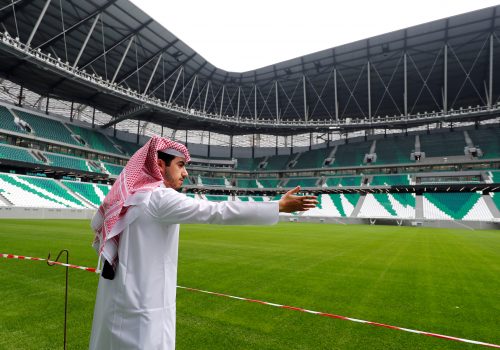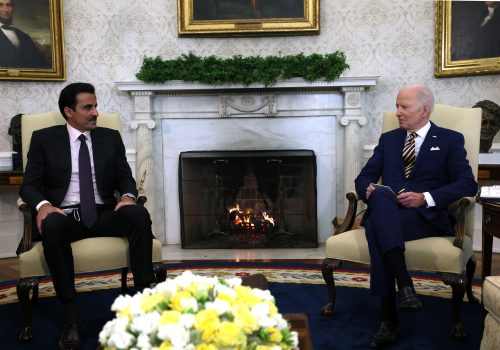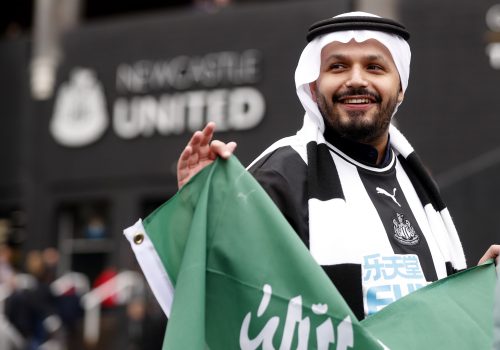Can soccer plead ignorance? A World Cup of politics is brewing for Qatar 2022.
After Russia invaded Ukraine on February 24, the international community’s reaction was swift in providing direct military support for Ukraine, levying severe sanctions against Russia, and releasing statements of condemnation. Eventually, the geopolitics of the invasion crept into the world of soccer, too. As much as it has historically tried to avoid geopolitics impacting the sport, FIFA, the international soccer governing body, had to address Russian aggression by suspending Russia and its soccer clubs from all competitions on February 28, including the ultimate one: the 2022 World Cup tournament in Qatar.
Russia’s suspension by FIFA was significant for two reasons. First, FIFA historically doesn’t punish countries for intrastate conflicts. Secondly, this is the first time that FIFA sided with boycotters. Moreover, the integration of politics with the World Cup goes beyond the Russian invasion, as the choice of Qatar as the host nation invited significant backlash.
The Russian geopolitical soccer ball
To qualify for the World Cup, several national teams faced the possibility of playing against Russia. Russia was expected to host Poland on March 24 in Moscow, but Poland’s captain, Robert Lewandowski, led the effort to boycott the game. He received the full backing of the Polish Football Association, who later—jointly with the Czech Republic and Sweden—announced that it is officially boycotting qualifying games in Russia. After a weak initial response, FIFA eventually caved to public pressure by suspending Russia from all competitions.
FIFA’s speedy suspension of Russia marks the first time since 1950 that FIFA allowed intrastate conflict to play a role in its disciplinary decision-making without a prior United Nations (UN) resolution preempting it. Since World War II, most intrastate conflicts haven’t resulted in suspensions from FIFA. Two prominent examples stand out. England and Argentina participated in the Spain World Cup in 1982, despite the UK considering withdrawal during the Falkland War occurring earlier that year. Additionally, Iran and Iraq fought a brutal eight-year war during the 1980s, but FIFA suspended neither nation from the 1982 and 1986 World Cups (with Iraq—the aggressor—even qualifying for the latter tournament).
FIFA has suspended national soccer federations before for government discrimination or interference, but never for political reasons. FIFA has tried to separate politics and soccer, even policing each nation’s soccer federations to ensure no political interference from governments. Russia’s case may be different due to its brutality, the obvious victim role of Ukraine, and the massive outpour of support across Europe. But, more significantly, FIFA reacted only after the International Olympic Committee condemned Russia for breaking the “Olympic Truce,” which may partly explain FIFA’s response.
It’s worth noting that, when domestic political interference does occur, FIFA’s reaction is swift in punishing guilty countries. Most recently, in February, the organization suspended Kenya and Zimbabwe from all competition due to alleged political interference by their national governments in the operations of their national soccer federations. Since then, Russia has also been banned by the International Paralympic Committee, Union of European Football Associations, and several others, putting the sports world at the forefront of efforts to boycott Russia.
The second reason the suspension of Russia was significant is that it marks the first time FIFA sided with boycotters instead of the boycotted team at such a speedy rate and without a prior UN resolution. Historically, FIFA doesn’t punish states facing a boycott. Take Israel, for example, which was boycotted by many of its neighbors since its founding in 1948. The boycott led to Israel making it through the initial qualifying round for the 1958 World Cup without playing a single match—it eventually lost to Wales in the final qualifier—as the boycotting Arab countries had to accept the losses.
However, in the case of Russia, the boycotting nations—Poland, Sweden, and the Czech Republic—didn’t lose their chance at qualifying. The only difference for these countries after the boycott is that they now face less competition for a coveted spot at the World Cup. With Russia’s suspension and an ongoing conflict, the political power of sports may be brewing for Doha later this year.
Where are the political bright spots?
As the world prepares for the 2022 World Cup, soccer is now part of Qatar’s diplomatic arsenal, as Doha effectively considers the World Cup as key to its legitimacy, brand, and nation-building efforts in the Gulf region—efforts that intensified after the Saudi-led blockade in 2017. Soccer has been key in helping the country court the West and improves its image overseas.
After the historical Al Ula declaration that ended the blockade in January 2021, many sports fans across the region saw sports as a potential uniting factor among cultures that value, above everything else, unity, cooperation, and social fabric that transcends borders. The 2022 World Cup in Qatar presents unique opportunities for other states in the Gulf to project soft power and receive a major push, both mediatic and logistic, in their efforts to host global sports events that help diversify their economies and increase their tourism prospects.
Additionally, as the economies of the Gulf states recover from the COVID-19 pandemic, this major global event is a unique chance for these countries to revive the spirit of the Gulf Cooperation Council (GCC) charter and embrace it as a World Cup for all Arabs. As FIFA’s President Gianni Infantino added in 2021: “Football has shown throughout this crisis that it is a unique platform of exchange for people of the Gulf and I am sure the game will continue to unite the region in the near future.”
As the World Cup start date of November 21 gets closer, it remains to be seen how GCC unity during a major global sports event in the region would translate into improved relations. The potential and expectations for unity and integration are high and soccer that sees no borders could play a major role in reuniting the GCC.
Why is it important that this world cup could turn political?
The 2022 World Cup will inevitably be highly political. Although the Russian suspension and choice of host nation are prime examples of global politics impacting soccer’s premier showcase, there will be other notable examples of politics creeping into the World Cup. One example is when the United States and Iran face off on November 29. It will be the first time these rivals have faced each other in a World Cup since 1998—a game which saw Iran defeating the United States.
Undoubtedly, there may very well be more politicization of the World Cup as the competition kicks off, and this year may be the most political world cup yet. Russia’s recent expulsion by FIFA from playing in the tournament is a sign that soccer is fully united in support of Ukraine.
Russia has invested massive amounts of money for sportwashing during the 2018 World Cup and 2014 Winter Olympics in Sochi to bolster its reputation abroad—including during the annexation of Crimea in 2014. Why is it important that this World Cup could be more political? Because it shows that sports have significant political power and are increasingly unable to plead ignorance, especially when they are major world events that can gather so much of the world’s attention. With these recent bans on Russia, one thing is clear: soccer is now politics and any credible idea that sports are apolitical has finally been put to rest.
While warranted and just, FIFA’s reaction to the Russian invasion opens the door for more questions in the future. The precedent it sets will undoubtedly be applicable in other situations. For example, if China invades Taiwan—recognized as Chinese Taipei by FIFA—will FIFA suspend China from all competition? Such questions apply to countless global conflicts, including in Ethiopia and Myanmar. FIFA and other sports committees will need to seriously define ethical standards for participation moving forward instead of just reacting to current events. In other words, it needs to set the tone and lead the way. Ethical standards must be better defined before awarding any World Cup moving forward, including but not limited to: labor rights, gender equality and women’s rights, and guaranteeing the safety of LGBTQI and other religious and ethnic minority fans, as well as journalists.
Given that Western coverage of Qatar 2022—the first Arab and Muslim country to ever host a World Cup—has been biased and somewhat based on double standards, it’s important to keep in mind that any kind of sports governance must be multicultural and diverse, both in policy and practice. A well-guided sports governance system with set ethical standards can make World Cups a catalyst—and a great incentive for potential host countries—for truly transformational social and human change.
Joze Pelayo is an assistant director at the Scowcroft Middle East Security Initiative/Middle East Programs. Follow him on Twitter: @jozemrpelayo.
Hamad Abbas is an assistant director at the Middle East Programs.
Further reading
Mon, Oct 19, 2020
Soccer for peace in the Middle East and North Africa
MENASource By
Although uniting around sport might be mainly symbolic, it could also be a confidence-building effort that could reduce tension and increase integration in a region that would mightily benefit from both.
Thu, Mar 3, 2022
As Qatar becomes a non-NATO ally, greater responsibility conveys with the status
MENASource By R. Clarke Cooper
Although Qatar’s eligibility for MNNA status doesn’t automatically include a mutual defense pact with the United States, being designated a MNNA state is very much a declaration that the United States wants a deeper and stronger security-cooperation relationship with Qatar and expects the country to play a greater role in regional security.
Mon, Apr 4, 2022
Many European soccer teams are owned by Gulf states. But why?
MENASource By Hezha Barzani
With a lucrative and rapidly growing European soccer market, it’s safe to say that Gulf nations will continue to invest in the beautiful game and reap benefits economically and socially.
Image: People pose for pictures next to the World Cup Trophy during an event marking "200 Days To Go" ahead of the 2022 FIFA World Cup, in Doha, Qatar May 6, 2022. REUTERS/Imad Creidi


